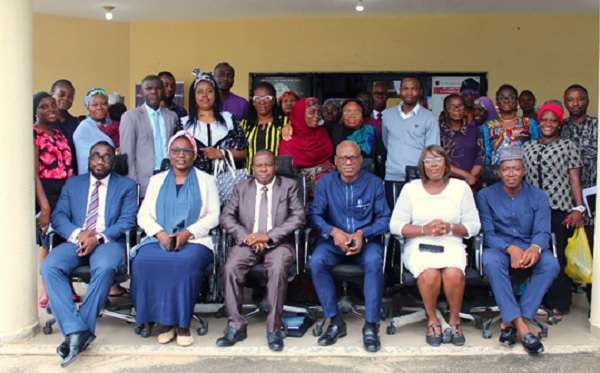
By Ifeoluwa Deborah Afolayan
In a renewed effort to promote transparency and accountability within public service institutions, the Anti-Corruption and Transparency Unit (ACTU) of the Pharmacy Council of Nigeria (PCN) hosted a sensitisation workshop on corrupt practices and prevention. The event, held at the Fred Adenika Auditorium, PCN Head Office in Idu, Abuja, drew participation from staff of the PCN Head Office and the Abuja Zonal Office.
The workshop was organised in collaboration with the Independent Corrupt Practices and Other Related Offences Commission (ICPC) and aimed at reinforcing ethical conduct and educating public officials on corruption prevention measures. Key discussions revolved around the importance of preventing corrupt practices within the public service, with a specific focus on the roles and responsibilities of ACTU across Ministries, Departments, and Agencies (MDAs). The penalties outlined in the ICPC Act 2000 were highlighted, emphasising the legal consequences for those involved in corrupt activities.
The establishment of ACTUs in MDAs, including the PCN, was described as part of a broader ICPC strategy to institutionalise integrity and good governance in government bodies. The Pharmacy Council of Nigeria’s ACTU was inaugurated on 25 November, 2022, following directives from the Office of the Head of Civil Service of the Federation (OHCSOF). Since then, the unit has actively worked to align with the ICPC’s mandate to promote transparency in public office.
To ensure the effectiveness of its operations, members of the PCN ACTU have undergone several capacity-building programmes, including a two-week intensive Certificate Course in Corruption Prevention (CCCP) in 2023, which was supported by the United Nations Office on Drugs and Crime (UNODC). This training focused on practical and result-oriented strategies to prevent corruption, equipping ACTU members with the tools to combat corrupt practices within their respective departments.
During the workshop, ACTU members were reminded of their statutory duties as outlined in Sections 7(1) and 70 of the ICPC Act 2000. These duties include conducting preliminary investigations into suspected corruption, educating staff on preventing corrupt practices, monitoring the implementation of budgets, and ensuring adherence to ethical standards across various departments. The workshop reinforced the need for continuous vigilance in promoting transparency in public institutions.
PCN’s commitment to fighting corruption is reflected in its recent ranking of 52 out of 404 MDAs in the ICPC’s Ethics and Integrity Compliance Scorecard (EICS) for 2023. The council achieved a commendable score of 68.80 per cent, measured across three core performance areas: Management Culture and Structure, Financial Management System, and Administrative Systems. This achievement is a testament to the PCN’s dedication to upholding ethical governance and transparency.
In his closing remarks, the Head of PCN ACTU reiterated the unit’s resolve to strengthen internal processes and ensure that the council remains compliant with national anti-corruption policies. He emphasised that the ACTU would continue to work closely with the ICPC to uphold transparency and ensure that staff members adhere to ethical standards in all their professional dealings.
The event, which attracted participants from both the PCN and ICPC, marked an important step in reinforcing a culture of accountability and transparency within the Pharmacy Council of Nigeria, furthering the council’s mission to contribute to the nation’s ongoing anti-corruption efforts.











[…] post PCN ACTU Holds Workshop to Combat Corrupt Practices appeared first on […]